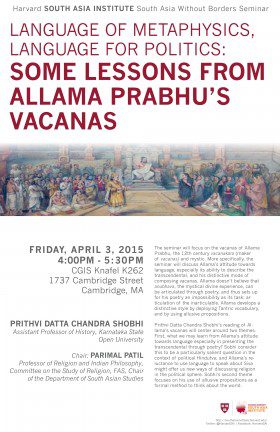South Asia Without Borders Seminar
Prithvi Datta Chandra Shobhi, Assistant Professor of History, Karnataka State Open University.
Chair: Parimal G. Patil, Professor of Religion and Indian Philosophy, Committee on the Study of Religion, FAS, Chair of the Department of South Asian Studies
The seminar will focus on the vacanas of Allama Prabhu, the 12th century vacanākara (maker of vacanas) and mystic. More specifically, the seminar will discuss Allama’s attitude towards language, especially its ability to describe the transcendental, and his distinctive mode of composing vacanas. Allama doesn’t believe that anubhāva, the mystical divine experience, can be articulated through poetry, and thus sets up for his poetry an impossibility as its task: articulation of the inarticulable. Allama develops a distinctive style by deploying Tantric vocabulary, and by using allusive propositions.
Prithvi Datta Chandra Shobhi’s reading of Allama’s vacanas will center around two themes. First, what we may learn from Allama’s attitude towards language especially in presenting the transcendental through poetry? Sobhi consider this to be a particularly salient question in the context of political Hindutva, and Allama’s reluctance to use language to speak about Siva might offer us new ways of discussing religion in the political sphere. Sobhi’s second theme focuses on his use of allusive propositions as a formal method to think about the world. Unlike Nāgārjuna or Digñāga, Allama is not a formal, systematic thinker. His engagement of other Indian intellectuals and their ideas is through the vacana mode. Are there any philosophical and hermeneutical lessons in Allama’s poetry?

